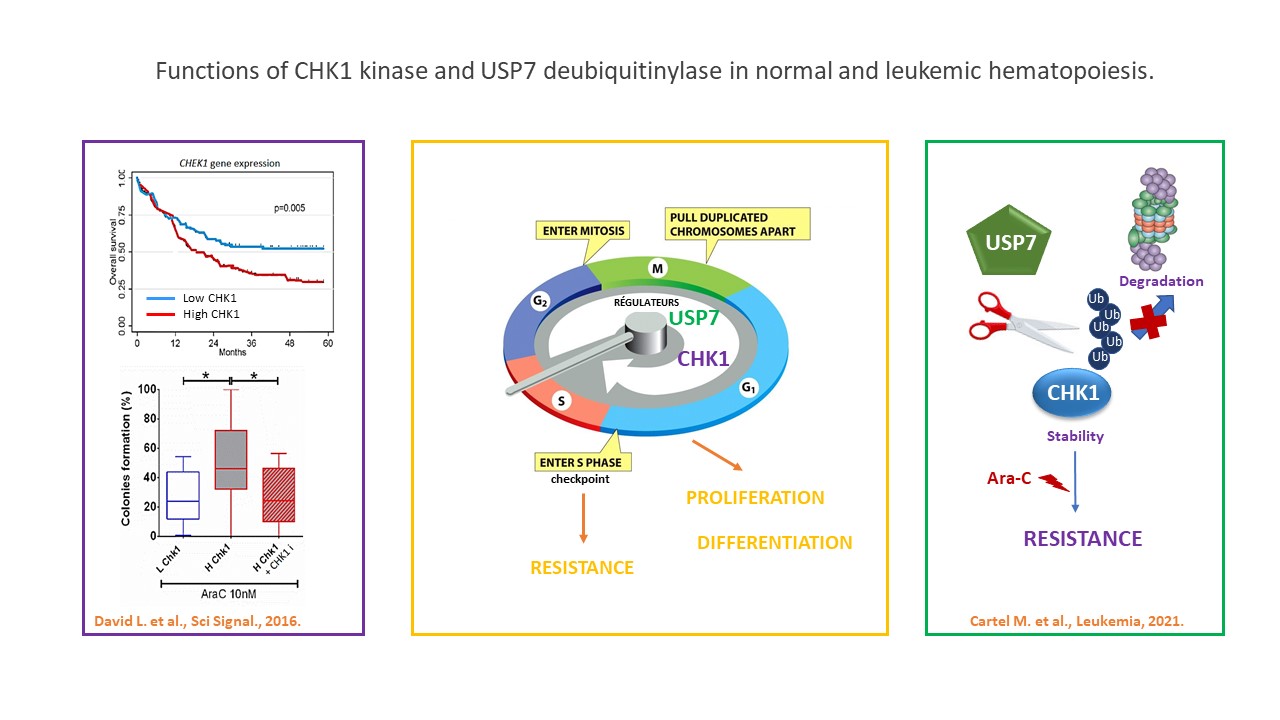
Functions of CHK1 kinase and USP7 deubiquitinylase in normal and leukemic hematopoiesis.
Christine Didier, PhD, CRCN CNRS
The treatment of acute myeloid leukemia (AML) represents a major clinical challenge due to frequent resistance to conventional therapeutic agents. Therefore, a better understanding of the pathophysiological mechanisms governing leukemogenesis should allow the identification of new therapeutic targets, and thus improve the prognosis of these diseases, which remains poor overall, especially in patients who cannot benefit from intensive chemotherapy.
In this context, our research has documented the importance of checkpoint kinase 1 (CHK1) in the proliferation and chemoresistance of AML (Didier C. et al., Oncogene 2008; Cavelier C. et al., Cancer Res. 2009; Yuan L. et al., Leuk Res. 2014; Yuan L. et al., Leukemia. 2014; Cartel M. et al., J Cell Sci. 2018; David L. et al., Sci signal. 2016 and Mol Cell Oncol. 2017). In addition, our research has been involved in the identification of novel functions of CHK1 during normal megakaryocytic differentiation, regulating the activity of the transcription factor NF-E2.
More recently, we have established that the deubiquitinylase USP7 is a major regulator of CHK1 protein level, participates in chemoresistance and relapse in AML and thus constitutes a new therapeutic target of interest in this pathology (Cartel M. et al., Leukemia. 2021).
Furthermore, our team has recently identified a genetic alteration of the deubiquitinylase USP7 in an adolescent with a very immature form of AML, suggesting that heterozygous loss of function of USP7 may contribute to leukemic initiation and progression in this patient.
The objectives of our research project are therefore (I) to further study the functions of the CHK1 kinase in normal hematopoiesis; and (II) to understand the impact of loss of function of USP7 in leukemic development. To this end, we propose through the study of a mouse model of USP7 haploinsufficiency (a) to decipher the functional and molecular impact of heterozygous USP7 invalidation on normal hematopoiesis, which remains unexplored to date; and (b) to study the consequence of the USP7 loss-of-function mutation in the process of leukemogenesis, whether or not it is associated with other molecular alterations identified in the patient

Key words:
- Proliferation,
- Cell cycle,
- Treatment resistance,
- Acute myeloid leukemia,
- CHK1 kinase,
- Deubiquitinylase USP7,
- Leukemic initiation and transformation.
Funding:
Ligue Contre le Cancer; Association 111 des Arts Toulouse; Fondation Roland Garrigou pour la Culture et la Santé (FONROGA 2021).

